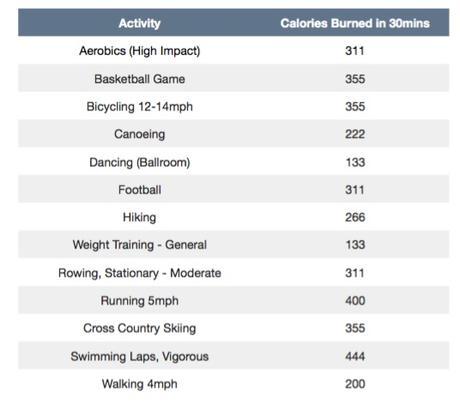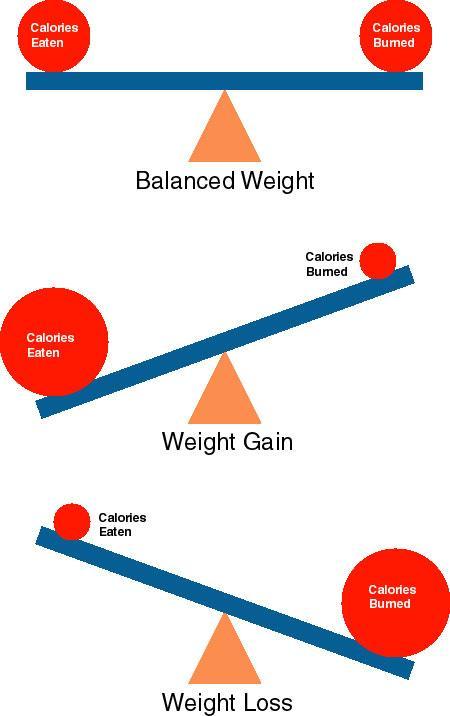
Exercise myth - not the best way to lose stomach fat?
54 million. The reported number of members attending gyms and fitness centres throughout the United States. When you consider the 2014 American population is reported at 319 Million, that really is a staggering proportion of gym goers. Although, I realise therein lies one big presumption… that those holding a membership are using them! An even more staggering statistic is the money spent on gym membership fees: $21.8 billion per year. Wow.
Publicity pronouncing exercise as the best way to burn stomach fat has reached fever pitch in recent times. Many health organisations lend weight to a cry for increased exercise to combat obesity. The US Department of Health and Human Services advocates a minimum 150 minutes per week of moderate intensity exercise for adults, or 75 minutes if you commit to a more vigorous exercise regime.
But it's not only health organisations lamenting a lack of exercise. An increasing number of companies have aligned themselves to the exercise movement, singing the praises of regular physical activity. It’s probably no surprise a lot of these are food manufacturers.
Forgive me for sounding a little untrusting or even cynical, but it often appears companies have a lightly veiled agenda encouraging their support. Sponsorship of sporting events or fitness pursuits frequently seems less about social conscience or philanthropy, and rather a mutually beneficial business arrangement or clever PR strategy.
McDonalds, for instance, have far reaching sponsorships in the sporting arena, from Little League through to major global events such as the Olympic Games or Fifa World Cup. Coca Cola is another trying to divert public focus on unhealthy food practices. They are withstanding growing calls to restrict sugar consumption by joining the chorus trumpeting exercise as the best way to burn stomach fat.
Innumerable food producers have plenty to gain by attributing obesity to a lack of exercise, rather than specific food choices. Some authors have even compared the approach of food manufacturers to the historical Tobacco industry method of creating doubt, denial and confusion.
This strategy somewhat backfired on CocaCola when it became apparent last year they were funnelling millions of dollars to researchers, encouraging them to endorse the importance of boosting exercise to stay healthy, as opposed to avoiding soda and fast foods.
But is exercise working?

Best Way To Burn Stomach Fat?
Despite increased focus on exercise to combat weight gain, some 600 million people worldwide are categorised as obese. That volume has more than doubled in the past 25 years. Not only that, 1.9 billion (yes… billion) adults over the age of 18 are now considered overweight. Unbelievable.
With those astonishing stats in mind, the question needs to be asked: Is exercise actually effective in weight loss? Or are we wasting countless mornings or evenings plugging away at the gym for the purpose of losing belly fat?
Exercise is useless…

Is exercise useless for burning stomach fat?
An increasing body of researchers are convinced exercise isn't the answer. In fact many fitness authors claim exercise is ‘useless’ in the battle of the bulge. One such article analysed the impact of exercise on weight loss, challenging it’s viability as a method to combat obesity.
Let’s examine this further.
There is strong scientific support for dietary modifications and weight loss. I can’t argue with that. And I agree whole-heartedly with many of the points authors Julia Belluz and Christophe Haubursin make throughout the article. But… I also know from personal experience that specific exercise interventions have been impactful on body fat levels, in absence of a conscious change in calorie consumption.
Does the recently formed view that exercise is a 'waste of time' for weight loss mean doom and gloom for the fitness industry? I don’t think so. But let’s explore the evidence.
Belluz and Hauburson suggested three key reasons exercise was surplus to requirements. Let’s take a quick look at those.
Exercise has a minimal impact on daily energy expenditure

What is the best way to burn stomach fat?
Before we talk about calorie burning it's important to understand the three key contributors to total energy expenditure. First, your resting metabolic rate (or basal metabolic rate) refers to the amount of energy, or calories, your body requires to function at rest. The next contributor is the thermic effect of feeding (sometimes called dietary induced thermogenesis). Your body requires energy to process food you consume for storage or use. And finally, your body is burning energy or calories constantly during the day through physical activity.
The majority of daily energy expenditure is accounted for by your resting metabolic rate. From 60% and up to 80% according to Landsberg et al. And it's difficult to shift this rate significantly. The thermic effect of feeding typically accounts for 10% of energy expended. The mathematicians among us will realise the impact of physical activity on calorie burning varies between 10% and 30%.
Now it pays to remember that exercise is only a small subset of this number. The term physical activity encompasses all muscular activity you complete during the day from physical work, walking, standing, reaching, grasping and much more. It's not just about purposeful exercise.
While reports examining the magnitude of impact exercise has on this number can be conflicting, many assume it is minimal.
I don't agree with the assumption exercise is useless for weight loss. After all losing weight is about energy balance, a numbers game. However, I will concede that 100% of energy intake comes from food and drink… whereas physical activity makes up a much smaller proportion of energy output. Curtailing food consumption is an easier lever to pull when seeking weight loss.
So, exercise is surplus to requirements for losing belly fat then? Well, not exactly.
Exercise does not generate a substantial calorie deficit
The second key point raised in the aforementioned article was that caloric deficit created through exercise is insignificant. What does this mean? Basically that the volume of calories you burn during exercise is not great enough to cause a step change in weight loss efforts.
First let's consider how many calories you burn when you exercise… Check out the table below.

That probably tells a story. Even after 30 minutes hiking every day for an entire week you've only burned 1862 additional calories. Now to some that might sound like a reasonable amount... until you consider you need a 3500 calorie deficit to lose a single pound of fat from your body. To shift a measly 2 pounds of fat in a week you should burn 7000 more calories than you consume.
That is beginning to sound difficult relying on exercise alone. Particularly if you're adhering to one of the exercise options above.
A study into the effects of diet and exercise, alone or combined, looked at this issue in more detail. Researchers examined 439 overweight to obese postmenopausal sedentary women. Why postmenopausal? Primarily because they're a population whom fewer studies are targeted despite a high prevalence of obesity.
The study compared the impact of a calorie reduced low fat diet both combined with moderate intensity aerobic exercise and independently. Participants in the exercise treatment group performed 45 minutes of aerobic exercise five times per week over a 12 month period.
Perhaps supporting the emerging theory about exercise, the diet only group demonstrated overwhelmingly the highest average weight loss, an 8.5% reduction. The control group demonstrated a non-significant 0.8% decrease.
The good news for workout enthusiasts was that exercise did demonstrate significant weight loss when compared to the no exercise control group. A weight loss of 2.4%. Yes, it isn't as startling a reduction as the diet only crowd, but it did produce a weight loss benefit.
The combined group, exercising while undergoing a low calorie low fat diet, observed the greatest change - a 10.8% loss. The researchers concluded lifestyle changes involving a combined intervention of diet and exercise were best for reducing body weight and adiposity.
Ok, exercise alone is not as effective as dietary intervention… I get that. But it is of some use then… right?
Other reasons exercise won’t make you thin
So long as you control calorie consumption and bump up your exercise - it appears there is an opportunity to shift some extra belly fat. Admittedly that assumes you're not wired heavily towards weight gain with really poor nutritional choices.
Some scientists suggest controlling calories can be difficult when embarking on a fitness program. In fact they suggested a number of ways you could be undermining weight loss attempts through exercise.
One of the primary reason some experts believe exercise can interfere with weight loss is a tendency to overestimate calories they have burned. Think about this for a second. A half hour of hiking might burn 266 calories. A small bottle of coke straight after and you have already consumed 201 of them again. A cream donut (320 calories) and the situation is worse.
More so, individuals have a tendency to compensate for workouts with more food. Do you think exercise hasn't changed your eating patterns that much? A remarkable study by Dr Timothy Church, the Chair In Health Wisdom at LSA, suggests otherwise.
Church took 464 overweight women not accustomed to exercising. Three groups worked out with a trainer for either 72min, 136 min or 194 min per week. This went on for six months. The remaining group were instructed to maintain ordinary eating practices.
What happened? Everyone lost weight. Yep even the control group. Potentially the study prompted them to modify their eating slightly - despite the best intentions of the researchers. The interesting finding however was that those exercising with trainers did not lose significantly more weight than the control group.
Church attributed this to compensation. He suggested those that were training hard compensated with unhealthy foods after a trip to the gym.
While exercise may assist in losing weight if you maintain calorie consumption habits… it seems this is easier said than done.
Why exercise CAN still help you lose weight

Exercise the best way to lose stomach fat?
Ok, I probably haven't done anything to convince you of the importance of getting your shoes on hitting the local gym or plodding the pavements. I could tell you that exercise will improve your fitness, boost heart and lung function, reduce cholesterol levels and provide a wonderful euphoria and sense of well being. But that probably won’t satisfy you if your primary goal is to lose weight.
My biggest fear of the negative perspective on exercise and the advice some professionals are delivering is that it will discourage people to train in their quest to lose weight, or at least discount the vital role it still plays.
Yes, no amount of exercise will make up for poor eating habits… as they say “abs are made in the kitchen”. But now I wanted to flip the discussion and consider how exercise DOES drive weight loss and why it is still one of best ways to burn stomach fat. Why should you… actually MUST you... incorporate it into any weight loss routine.
A calorie is still a calorie
There is frequent debate whether certain calories are better or worse than others. I don't want to go into too much detail on this here. Some researchers argue sugar calories promote the storage of fat and the associated insulin response makes people hungrier and more inclined to over eat. Nutritionists often declare the best way to burn stomach fat is to restrict intake of simple carbohydrates such as those in sugary drinks or junk food.
Others academics will argue a calorie is just a calorie when it comes to weight loss, instead focusing on delivering an overall negative energy balance. Interestingly, a nutrition professor lost 27 pounds in two months on what he termed the 'Twinkie diet'. He was basically eating junk food but controlling calorie intake to prove his belief calorie counting is what matters most.
What has this got to do with exercise? I suppose what I am trying to say is that any efforts to burn calories and change a positive energy balance (weight gain) to a negative one (weight loss) are beneficial as you try to shift excess belly fat.
Exercise may seem less significant than diet, but so long as you implement an effective programme that can slow or reverse your current weight gain it is worthwhile. Weight loss is about small steps... and any little bit can help.

Image credit: https://tunedintocycling.com
Higher intensity exercise can shift more calories
A lot of studies, such as one on post menopausal women above, refer to impact of low or moderate intensity aerobic exercise on weight loss. In most cases the exercise intervention doesn't shift a significant amount of fat. Remember I mentioned a 2.4% decrease? This might be ok if you are only trying to shift a few pounds. But if you need to lose significantly more… is exercise beneficial?
The problem with a lot of these studies is they focus on low or medium intensity aerobic exercise. The truth is high intensity exercise is far more effective in blasting calories. It can also boost calorie burning long after training is complete. I have no doubt if the researchers opted for higher intensity programs weight loss gains would have been enhanced significantly.
But don’t take my word for it.
A 2011 study in Medicine and Science in Sports and Exercise suggested high intensity exercise was associated with higher energy requirements and thus was more effective than low intensity at improving body composition. A further study published in the Journal of Obesity stated that HIIT or High Intensity Intermittent Training was superior when reducing belly fat. Researchers attributed improvements in aerobic and anaerobic fitness, plus enhancements in skeletal muscle profile.
Tremblay et al compared aerobic steady state exercise against higher intensity alternatives during cycling. Participants completed a 15 week intervention either cycling at 60% VO2Max for 40 mins, or completing 20 minute sessions of intermittent sprints. The subjects completing high intensity training lost significantly more subcutaneous fat than those on the aerobic program.
Yes, low, slow aerobic exercise may have a negligible impact on subcutaneous and abdominal fat. However, evidence suggests other forms of exercise can contribute more effectively. Not only that, regular HIIT training has been shown to lower insulin resistance, and improved fatty acid oxidisation.
It’s not just about the exercise
The concept of ‘afterburn’ is a controversial one. What is it? Sometimes known as 'excess post-exercise oxygen consumption', afterburn refers to an elevation in metabolism (and associated calorie burning) experienced after an exercise session is completed. Your body needs to perform a number of tasks to return your body to it's pre exercise state. Accordingly, there is an increase in oxygen consumption to achieve this.
So why is this controversial? There is still a lot of uncertainly about the impact of the afterburn. How big? How long does it last? How does it contribute to weight loss?
Several studies suggest a link between metabolism increase post exercise and the level of intensity during a workout. Again, a higher intensity session may provide increased post exercise fat burning.
Knab et al demonstrated an increase in metabolic rate for 14 hours following a 45 minute intensive exercise program. Results showed an extra 190 calories were burned in the 14 hours after participants hopped off the bike, when compared to days they did not exercise.
When you begin to add the volume of calories from a few days of high intensity exercise, plus an increase in calorie burning afterwards, exercise is starting to seem more than just ‘useless’ when it comes to weight loss. At least in my opinion.
Impact on metabolism and muscles

Ways to burn stomach fat
You may have heard the old adage muscle burns more calories than fat. Increase your muscle mass and the body will burn more calories naturally. This has the potential to help fat loss.
But let's not get carried away here… you're not going to burn hundreds more calories just by adding a little extra muscle to your frame. The calorie increase per pound is pretty low. Wang et al suggested that one pound of muscle burns 6 calories per day. Other sources have suggested 7-10 calories.
Regardless of the exact number, we are talking reasonably small increments. But they all still help your overall calorie burning capacity.
Ladies, please don't be concerned when I suggest you need to add muscle to your frame. We are not talking about turning in to Arnie. Undertaking weight training will not make you big and bulky. Adding lean muscle to your frame will not only provide a wonderful appearance, but it may accelerate weight loss gains you are experiencing.
Exercise provides improved flexibility with your food intake
My final point on the benefit of exercise for weight loss in in relation to the flexibility it allows with dietary patterns. Regular exercise means you can afford to be less rigid with your nutrition than you might otherwise. The occasional over indulgence can be countered out by efforts in the gym.
This is particularly useful with weight maintenance. Often after losing weight or achieving a weight loss goal it's easy to waver from stringent eating habits - some diets can be extremely difficult to maintain. A body of research suggests exercise is the best predictor of weight maintenance and several major organisations advocate moderate physical activity for weight loss control.
Summary
Despite calls to reframe the way we promote exercise and to shift the focus on weight loss… exercise still plays an important role in how we lose belly fat.
No, it's not about physical activity alone. Yes, some fortunate individuals have the luxury of losing weight simply with the addition of a few exercise sessions a week. For most it is a combined approach - sensible nutrition strategies, alongside tailored exercise programs that focus on increasing calorie burning potential. Weight loss is the sum or all parts, not simply the output of reduced calorie consumption.
Are you currently trying to lose weight? We would love to hear about your approach below?

